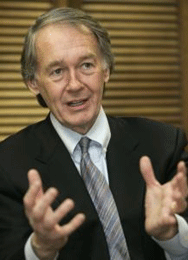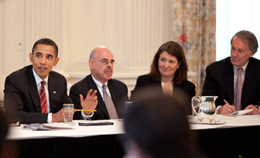Historic Climate Bill Passes House Committee
Air Date: Week of May 22, 2009

The climate bill's co-author, Rep. Edward Markey.
Host Jeff Young interviews Massachusetts Democratic Representative Ed Markey about the historic climate change and clean energy bill he co-authored and is now shepherding through Congress.
Transcript
CURWOOD: From the Jennifer and Ted Stanley studios in Somerville, Massachusetts, this is Living on Earth. I’m Steve Curwood.
YOUNG: And I’m Jeff Young in Washington where a sweeping clean energy and climate change bill reached a milestone in Congress. The powerful House energy and commerce committee narrowly approved the bill by Democrats Henry Waxman of California and Ed Markey of Massachusetts.
CURWOOD: The Waxman-Markey Bill’s focal point is a cap and trade system for controlling greenhouse gases. And that’s also the focus of great controversy. Most environmental groups and some businesses support the bill, saying it’s the best chance to start cutting emissions at home and get the U.S. into an international agreement at talks at Copenhagen later this year.
Other activists say the measure doesn’t go far enough and that it’s trading system gives away too many of the valuable emissions credits.
YOUNG: Many industry groups and Republicans fought to kill the bill, and Waxman and Markey faced intense negotiations with moderate members of their own party. Democrats from coal country, the oil patch, and heavy manufacturing states were nervous about the bill’s economic impact. Waxman and Markey agreed to give electric utilities and some energy intensive industries most of the emissions credits they’ll need for free in the early years of the trading program.

Rep. Markey(D-MA) (far right) discusses the climate change bill at the White House with President Obama, Chairman Henry Waxman (D-CA) and Rep. Diana DeGette (D-CO). (Courtesy of Congressman Markey)
MARKEY: Just the opposite. This bill has very strong targets. Seventeen percent reduction in greenhouse gases in the United States by 2020 and over 80 percent by 2050. It is a very ambitious bill. We’re keeping those targets intact. And in addition we have very strong goals for creation of renewable electricity in the United States, strong new building codes, 50 percent improvement in the efficiency of new buildings and on and on throughout the legislation – historic provisions that will transform the American economy and begin the process of backing imported oil out of our country.
YOUNG: But compared to say what our European partners are prepared to do – they’re talking about something like 25 to 40 percent reductions below 1990 levels in that early time frame 2020 target. Seems to me we’re gonna go to Copenhagen looking like we’re a lot weaker in terms of what we’re willing to do here.
MARKEY: The European Union is extremely cognizant of the fact that the Bush administration for eight years did nothing. That is why they booed the Bush administration at Bali two years ago. They understand why we’re behind. It’s not the American people. It was the Bush administration. So the goals that we’re putting together are very ambitious and that is something, which is appreciated by the European Union, by other countries in the world, and it’s why President Obama will go to Copenhagen as a hero.
YOUNG: You had to give away a lot of these emissions credits in order to win support. Were you surprised that you ran into that kind of resistance from Democrats and is there a concern that giving away those credits sets us up to repeat some of the mistakes that the Europeans did when they gave away a lot of the credits rather than auctioning them off?
MARKEY: We have factored in the mistakes that was made in the European Union. We always anticipated that it would be necessary to protect consumers from rate spikes and that is why some of the credits have been given away. We also knew that we would have to protect trade sensitive energy intensive industries. We don’t want the Chinese to be able to exploit a program meant in the United States to reduce our carbon footprint by having our steel, aluminum, paper and other trade sensitive industries destroyed by foreign competition over the first five to ten years. And so – no. All along Henry Waxman and I knew that we would have to build in transitional programs to help consumers, to help particular industries so that we made this transition in a way that did not harm our economy.
YOUNG: And is this as strong as this bill can get in terms of its emissions reductions targets? Is it kind of downhill from here, further compromises ahead when this hits the House floor or goes to the Senate?

Congressman Markey.
YOUNG: That’s energy subcommittee chairman Ed Markey, co author of the American Clean Energy and Security Act, which just passed the energy committee. The bill still has a long road ahead before the House takes it up, and the Senate, with its 60-vote threshold could prove even tougher political terrain.
Links
Listen to an interview with Democratic Congressman Jay Inslee (D-WA).
Listen to more of Jeff Young’s interview with Congressmen Markey.
Read an analysis of the bill’s emissions reductions by the World Resources Institute.
Read about the American Clean Energy and Security Act and its amendments here.
Living on Earth wants to hear from you!
Living on Earth
62 Calef Highway, Suite 212
Lee, NH 03861
Telephone: 617-287-4121
E-mail: comments@loe.org
Newsletter [Click here]
Donate to Living on Earth!
Living on Earth is an independent media program and relies entirely on contributions from listeners and institutions supporting public service. Please donate now to preserve an independent environmental voice.
NewsletterLiving on Earth offers a weekly delivery of the show's rundown to your mailbox. Sign up for our newsletter today!
 Sailors For The Sea: Be the change you want to sea.
Sailors For The Sea: Be the change you want to sea.
 The Grantham Foundation for the Protection of the Environment: Committed to protecting and improving the health of the global environment.
The Grantham Foundation for the Protection of the Environment: Committed to protecting and improving the health of the global environment.
 Contribute to Living on Earth and receive, as our gift to you, an archival print of one of Mark Seth Lender's extraordinary wildlife photographs. Follow the link to see Mark's current collection of photographs.
Contribute to Living on Earth and receive, as our gift to you, an archival print of one of Mark Seth Lender's extraordinary wildlife photographs. Follow the link to see Mark's current collection of photographs.
 Buy a signed copy of Mark Seth Lender's book Smeagull the Seagull & support Living on Earth
Buy a signed copy of Mark Seth Lender's book Smeagull the Seagull & support Living on Earth

